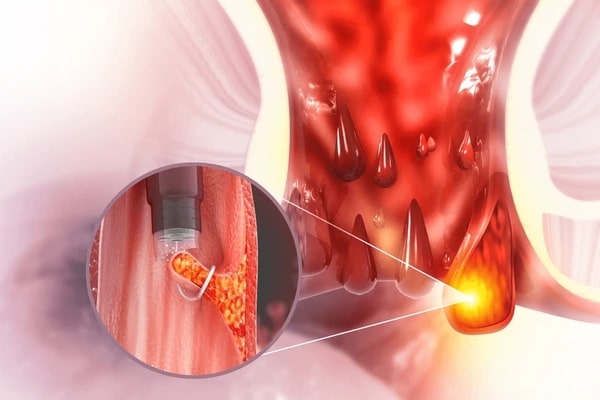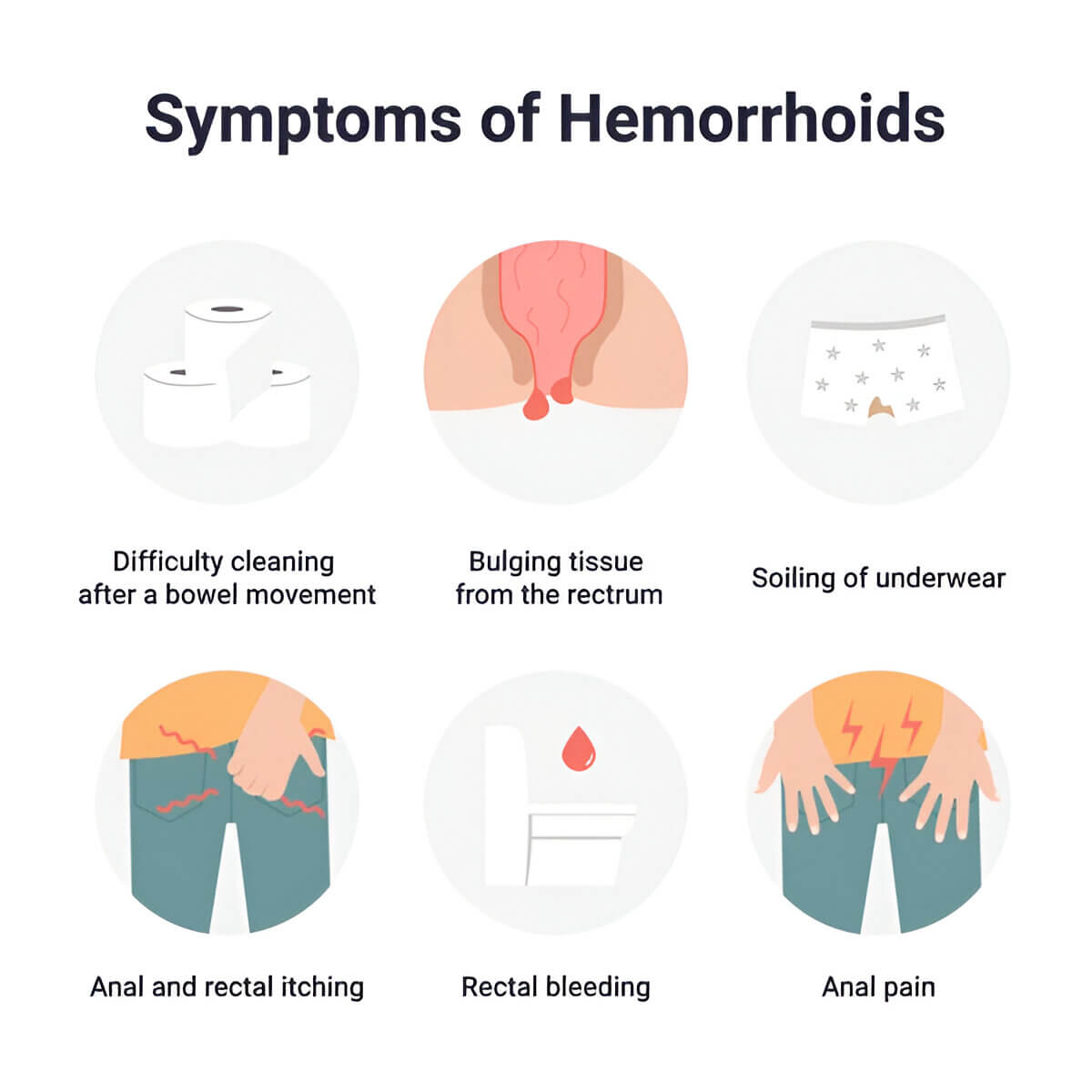Understanding Hemorrhoids: Symptoms, Causes, and Treatment Options
Hemorrhoids, also known as piles, are a common medical condition affecting millions of people worldwide. They occur when veins in the rectum or anus become swollen, causing discomfort, itching, and even bleeding. Understanding the symptoms, causes, and treatment options is essential for managing this condition effectively.
Dr. Pramod D. Bahekar, a leading piles surgeon in Dombivli with over 22 years of experience, specializes in providing relief to patients suffering from hemorrhoids and related conditions.

What Are Piles (Hemorrhoids)?
Hemorrhoids are swollen veins located in the lower rectum and anus, and they can be internal (inside the rectum) or external (under the skin around the anus). While they can be uncomfortable, they are often manageable with proper care.
Hemorrhoids commonly cause pain, itching, and bleeding, especially during bowel movements. If untreated, they may worsen and require medical intervention.
Types of Hemorrhoids
Hemorrhoids are categorized based on their location and symptoms, which can vary in severity and discomfort.
Internal Hemorrhoids
Internal hemorrhoids are located within the rectum. They are generally painless because they lie in an area with fewer pain-sensitive nerves. Symptoms of internal hemorrhoids may include painless bleeding during bowel movements. In some cases, they may prolapse, extending outside the anus.
External Hemorrhoids
External hemorrhoids are located beneath the skin around the anus and can be painful when swollen. Symptoms include itching, discomfort, and visible swelling. When these hemorrhoids become inflamed, they may lead to bleeding and irritation.
External Hemorrhoids in Females: Women, particularly those who are pregnant or postpartum, may experience external hemorrhoids more frequently due to increased pressure in the pelvic region.
Prolapsed Hemorrhoids
Prolapsed hemorrhoids occur when internal hemorrhoids push through the anal opening. These can cause significant discomfort, especially during bowel movements, and may need manual repositioning or medical intervention.
Thrombosed Hemorrhoids
Thrombosed hemorrhoids develop when blood pools in an external hemorrhoid, forming a clot. They are often very painful, with a swollen, hard appearance. Thrombosed hemorrhoids typically require medical treatment for pain relief and reduction.

Hemorrhoids Symptoms
The symptoms of hemorrhoids vary depending on the type and severity. Common symptoms include itching, pain, swelling, and bleeding.
Hemorrhoids Symptoms in Females
Women may experience hemorrhoids differently due to hormonal changes, pregnancy, and childbirth. Hemorrhoids are particularly common during pregnancy when the growing uterus places pressure on the veins in the lower rectum. Postpartum hemorrhoids can also be an issue due to the strain of labor.
Hemorrhoids Symptoms in Males
Men may experience similar symptoms, often triggered by lifestyle factors like heavy lifting, prolonged sitting, and poor diet. For men, bleeding, itching, and visible lumps are common symptoms of hemorrhoids, especially if they work in physically demanding jobs or lead a sedentary lifestyle.
Hemorrhoids Causes
Multiple factors can contribute to the development of hemorrhoids. Understanding these can help prevent or manage the condition.
Straining During Bowel Movements
Chronic constipation and straining can place extra pressure on the rectal veins, leading to hemorrhoids. Regular, soft bowel movements are essential for preventing strain-related hemorrhoids.
Pregnancy and Childbirth
Pregnancy is a significant risk factor for hemorrhoids, as the increased pressure in the abdominal and pelvic areas causes veins in the lower rectum to swell. Childbirth, especially vaginal delivery, can further aggravate hemorrhoids.
Sedentary Lifestyle and Lack of Exercise
Prolonged sitting, particularly on hard surfaces, increases the risk of hemorrhoids. Lack of physical activity can lead to poor circulation, making hemorrhoids more likely.
Obesity and Poor Diet
Excess weight, especially around the abdomen, puts pressure on the lower veins. A low-fiber diet can lead to constipation, increasing the risk of hemorrhoids. High-fiber diets, on the other hand, promote healthy bowel movements and reduce the likelihood of hemorrhoids.
How to Prevent Hemorrhoids?
Making lifestyle adjustments can help prevent hemorrhoids from developing or worsening.
High-Fiber Diet
Eating a diet rich in fiber promotes digestive health and prevents constipation, a major cause of hemorrhoids. Foods like fruits, vegetables, whole grains, and legumes are excellent sources of fiber.
Regular Exercise and Avoiding Prolonged Sitting
Exercise promotes blood circulation, reducing the chances of hemorrhoids. For those who work in desk jobs, standing up and moving around periodically can help reduce pressure on the veins.
Staying Hydrated
Adequate hydration supports healthy digestion and prevents constipation. Drinking plenty of water daily can help soften stools, making bowel movements easier and reducing strain.
Treatment Options for Hemorrhoids
There are various treatment approaches, ranging from conservative methods to advanced procedures, depending on the severity of hemorrhoids.
Home Remedies and Lifestyle Adjustments?
What Shrinks Hemorrhoids Fast?
Applying cold compresses, taking warm baths, and using over-the-counter creams can provide quick relief. However, these options are temporary and best for mild symptoms.
Minimally Invasive Procedures
For more severe hemorrhoids, minimally invasive procedures like rubber band ligation or sclerotherapy can be effective. These procedures are usually done in a doctor’s office and require minimal downtime.
Surgical Treatments
Laser Piles Surgery in Dombivli
Laser surgery is a preferred treatment for severe hemorrhoids. It uses focused laser energy to precisely shrink and remove hemorrhoidal tissue.
Laser piles surgery is minimally invasive, offers quick recovery, and reduces post-operative discomfort, making it a top choice for hemorrhoid treatment in Dombivli. Patients benefit from a faster return to normal activities with minimal complications.
Bleeding Hemorrhoids Treatment
When hemorrhoids cause persistent bleeding, it’s essential to consult a piles surgeon in Dombivli for evaluation and treatment. Advanced surgical options or minimally invasive treatments may be recommended depending on the bleeding’s severity and frequency.
When to See a Doctor for Hemorrhoids?
While mild hemorrhoids may be managed with home remedies, it’s important to seek medical attention if symptoms persist, worsen, or if there is consistent bleeding. Consulting with an experienced specialist like Dr. Pramod D. Bahekar ensures that patients receive personalized and effective treatment options.
Conclusion
Hemorrhoids are a common, often painful condition, but they are manageable with the right care. Understanding the symptoms, causes, and treatment options can empower individuals to take control of their health.
For expert treatment and advice on hemorrhoids treatment in Dombivli, Dr. Pramod D. Bahekar provides comprehensive care, specializing in laser piles surgery and other advanced treatments that offer effective and lasting relief.
